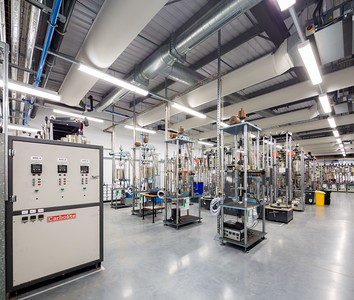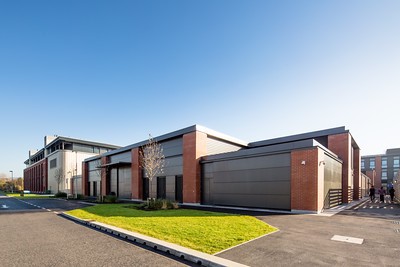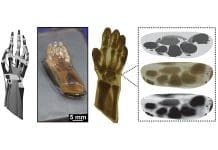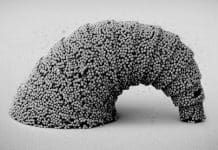Colin Small, Chief Operating Officer at Swansea Materials Research and Testing (SMaRT) Ltd outlines how the company provides industry and academia many forms of mechanical property assessment…
Swansea Materials Research and Testing Ltd (SMaRT) is a specialist spin out materials testing company created incorporated by Swansea University in 2009 to combine two long standing areas of expertise: world class characterisation of advanced structural materials and the academic interpretation of the mechanisms controlling materials deformation and fracture. Starting with one customer and three staff in 2009 SMaRT has now grown to eleven full time staff working with over thirty companies, turning over approximately £1M per year. Based on this success, in August 2015 SMaRT moved to a purpose built facility located in the Institute of Structural Materials Building on the new Swansea University Bay Campus. This provides world class accommodation for the test and research activities and allows a close working relationship between the research and testing activities the building houses.
With this unique combination of testing facilities and academic research, SMaRT provides industry and academia many forms of mechanical property assessment, whilst at the same time addressing bespoke forms of specimen or sub-element testing where novel test method development is required. In addition to generating mechanical test data, SMaRT has the capability to undertake post-test failure analysis utilising optical and scanning electron microscopy, electron back scattered detection and metallographic sectioning.
Academic staff affiliated to SMaRT, based in the Institute of Structural Materials, Swansea University, offer particular expertise in the fields of aerospace and power generation materials, including titanium and nickel based super alloys, advanced steels, metal and ceramic matrix composites. We have the capabilities to conduct short-term consultancies or support large scale, long term, research programmes.
Our equipment base offers an extensive creep laboratory (75 frames) and fatigue machines (60 frames) with ancillary facilities to support monotonic and cyclic waveforms under load or strain control at loads up to 250kN and temperatures ranging from -190oC to 1400oC. Environmental chambers allow for assessments under high vacuum, aqueous salt and hot corrosion conditions, including SO2 and alternative gaseous atmospheres. Torsion and thermomechanical fatigue (TMF) testing are available, particularly relevant to sub-element or even component test pieces (e.g. full scale aerofoils etc).

Swansea Materials Research and Testing Ltd, Creep Laboratory.
SMaRT is registered for ISO17025 accreditation under the regular surveillance of the United Kingdom Accreditation Service (UKAS), ensuring the quality of our operation. Five specific test types are accredited (detailed below):
- Tensile testing: BS EN ISO 6892-1:2009, BS EN ISO 6892-2:2011, BS EN2002-1:2005, BS EN 2002-2:2005
- Creep testing: BS EN ISO 204:2009, BS EN 2002-005:2007
- Stress rupture: BS EN ISO204:2009, BS EN 2002-005:20007
- Low and High Cycle fatigue (Load Control):BS EN 7270:2006
- Fatigue crack growth: BS ISO 12108:2012
In addition, the range of test frames and skills enables SMaRT to undertake a wide range of bespoke and novel testing outside of these directly accredited test types for a wide range of customers from the UK and overseas. Where necessary, SMaRT, in collaboration with the customer and ISM staff, actively develops testing to meet new customer needs, resulting in some unique test capabilities that give SMaRT world class capability, e.g. in thermomechanical testing and high temperature fatigue behaviour in hostile, gaseous, environments.
As a result, SMaRT has a direct input into many large UK materials research and development programmes through the provision of high quality materials test data, through both the academic research run through the Institute of Structural Materials and as a direct subcontractor to the programme participants. These programmes are focussed around the internationally agreed “ACARE 2020” and “Flightpath 2050” targets for more efficient gas turbine operation with accompanying reductions in fuel consumption and greenhouse gas emissions. This will be achieved by engine designs that operate at higher temperatures compared to the existing fleet, thus pushing the capability of existing metallic systems to their structural limits. The characterisation of metallic systems fabricated by advanced processing techniques is central to our interest. In addition, novel ‘Vision 20’ alloys are also under investigation – a new generation of materials for potential entry into service within 20 years (e.g. alloys beyond polycrystalline or single crystal forms of nickel currently used as the basis for high pressure turbine operations).
Our ongoing portfolio includes contributions to large scale initiatives funded through Innovate UK and the Aerospace Technology Institute (ATI), including:
- SAMULET II (Strategic Affordable Manufacturing of UK Leading Environmental Technologies):
- Advanced repair technologies (cost efficient high integrity blisk repair).
- SILOET II (Strategic Investment in Low Energy Turbines):
- CMC and high temperature technologies;
- High temperature nickel alloys;
- High temperature capability – compressors and discs;
- High temperature turbine technology and demonstration.
All of the above projects are aimed at improving manufacturing processes, increasing the material “fly to buy ratio” and to increase gas turbine efficiency. It is estimated that the deliverables from this combined portfolio should contribute to a 1% improvement in specific fuel consumption in Rolls-Royce civil engines, yielding a reduction of between 500 and 1000 tonnes of CO2 per aircraft per year within the next ten years, depending upon aircraft configuration and loading.
Colin Small
Chief Operating Officer
Swansea Materials Research and Testing (SMaRT) Ltd
+44 (0) 1792 602277
c.small@swansea.ac.uk
Please note: this is a commercial profile











